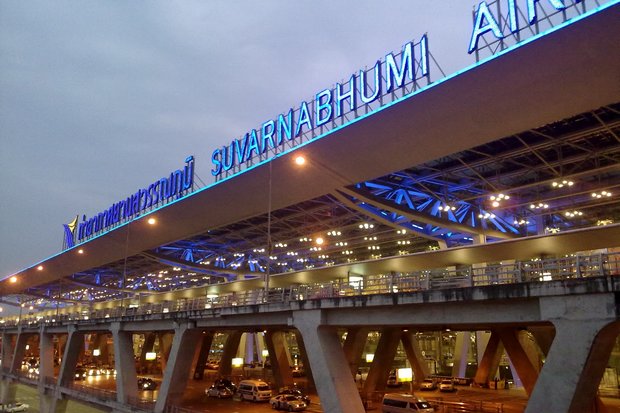
Airports of Thailand Plc (AoT) is set to inject 2.5 billion baht to replace all 700,000 square metres of asphalt with concrete on all the runways at Suvarnabhumi airport to permanently solve the threat of "soft spots" that have been reported there.
Terms of Reference (ToR) for the project will be announced by year end, AoT president Nitinai Sirismatthakarn said Tuesday.
The scheme is part of AoT's goal of improving ground safety conditions at the airport, he said.
The announcement comes after the International Federation of Air Line Pilots' Associations (IFALPA), which represents over 100,000 pilots and flight engineers in almost 100 countries, issued an alert last month specifying the risks of operating at Thailand's largest international airport.
The main risk was the discovery of several "soft spots" on taxiways, taxi lanes and aircraft stands at Suvarnabhumi. Flight crews and ground service providers have reportedly encountered these structurally unsound spots since 2008.
Suvarnabhumi, located in Samut Prakan's Bang Phli district, officially opened for service in September 2006. At over 32 million sq m it ranks as the largest airport complex in Southeast Asia.
It was constructed over a large swamp known as Nong Ngu Hao, or "cobra swamp", since it was reportedly a habitat for snakes before it was built. This has resulted in a high water table below the airport.
"Suvarnabhumi is facing problems related to soft spots because it was built this way," Mr Nitinai said. "Two years ago, we began construction of a sub-drainage system, where the underground water is pushed out through pipes towards surrounding waters whenever the land is pressured, such as when planes land or take off on runways."
The sub-drains have reportedly been operational for one year.
Mr Nitinai said there are currently a minimum of 21 soft spots at Suvarnabhumi, adding 11 have already been temporarily fixed.
Authorities would be able to deal with the remaining soft spots by August.
He said airport staff are being deployed around the clock to check for problems on the runways.
"Asphalt manufacturing firms do not sell small amounts of their product, as they only accept larger deals," he said. "What we have been doing as a temporary safety precaution is actually scraping off the asphalt in other areas [where extra asphalt is unnecessary] and paving it on the reported soft spots."
AoT's planned replacement of asphalt with concrete will increase the life expectancy of its runways to 10 years before they need maintenance, as opposed to the current five to seven years, he said.
Doing so will require contractors to scrape off 33-cm-deep asphalt and gradually replace it with Portland cement, the most common variety in use globally.
"A good quality of asphalt is that it is somewhat flexible, but this feature can become problematic for plane traffic at the airport," Mr Nitinai said. "It takes time for dimpled runways to return to their original shape, which causes delays for aircraft waiting to get on the lanes."
He said the ToR for the asphalt replacement plan will be announced in the new fiscal year, which begins in October. Once bidding commences and contractors are chosen, construction can begin by the middle of next year, he added.
However, Mr Nitinai said it would take at least three years for the asphalt to be replaced by concrete as the airport can only close off 10% of its taxiways and taxi lanes at a time.
The IFALPA has advised airlines to alert flight crews to the existing hazards related to push back and taxi operations at the airport, and to apply appropriate operating procedures to mitigate risk.
In a related development, Mr Nitinai said contractors for most of the construction contracts for Suvarnabhumi's second phase of development have been hired.
The airport's 62.5-billion-baht revamp project will involve the construction of a smaller concourse, an aircraft parking lot and an underground tunnel linking the main passenger terminal to the concourse using an automated people mover electric train network.
Mr Nitinai said that construction is set to be completed by November 2019. The new concourse, however, should be open by the middle of 2020, as system testing will take around six months to carry out, he added.